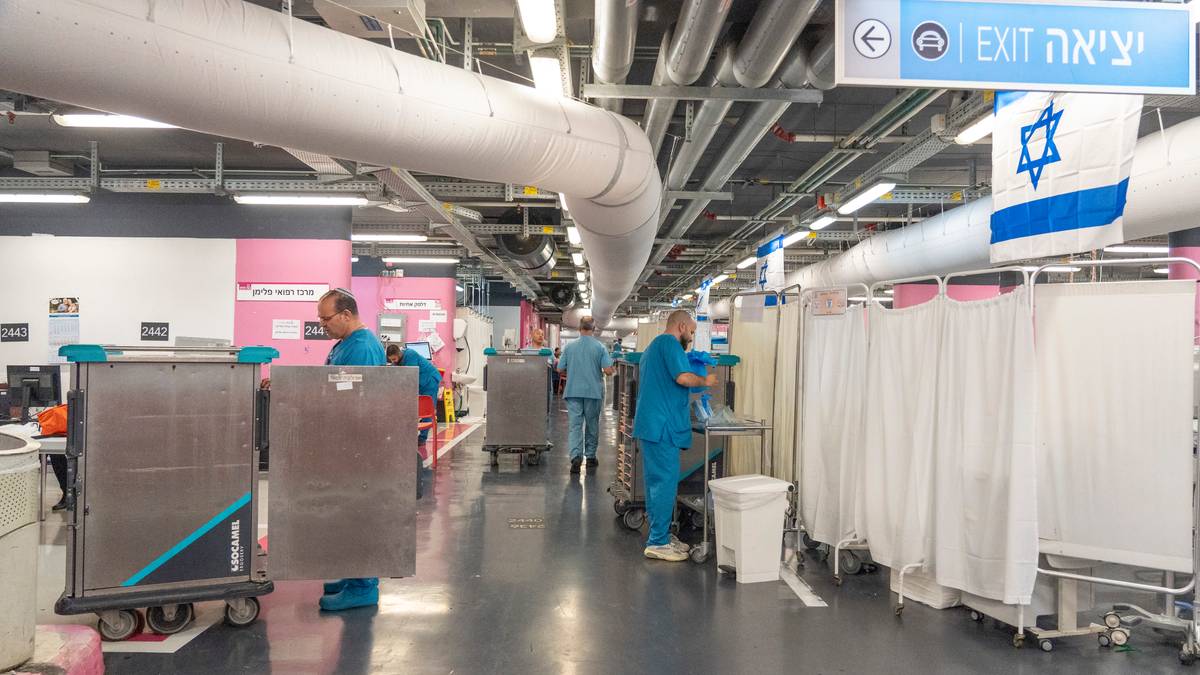The president goes to one of the places where he parked the car a short time ago. Now there are two beds there instead.
Patients are connected to a series of tubes and wires, and are placed in an artificial coma. They do not know that they are being monitored and treated in a parking garage.
Senior doctor Yaron Bar-Lavi has to find other places to park his car when he is at work.
Photo: Torsten Boy/NRK
-It works well, although the risk of infection increases when they are too close together. “We no longer think of this as a garage facility,” says Yaron Bar-Lavi, a senior physician in the intensive care unit at Rambam Medical Center.
He believes that the risk of infection is still disproportionate to the consequences of the missile attack.
On this day, there were three missiles against Haifa, but all of them were shot down by the Iron Dome missile defense system.
So the need after the last war
Bar-Lavi remembers what it was like to work here during the previous Lebanon war in 2006. Then they did not have safe places for patients.
– 46 missiles fell on an area near the hospital. The target was probably the nearby naval base. “So we'll probably keep these patients here as long as this continues, which could take a few months,” he says.

Many patients are in a coma and do not know they are being treated in a parking lot.
Photo: Torsten Boy/NRK
The experience of that war made them think again. When the car park was built in 2010, it was planned that it would be used as a bomb-proof hospital in the event of war.
In the huge garage there are, among other things, a maternity ward, four operating rooms and a dialysis centre.
In addition, employees can take their children here while they are at work.

Young children taking a nap in the parking lot.
Photo: Torsten Bohr/NRK
The ventilation system is as good as in the hospital building itself, and in each parking lot there is an entrance for oxygen, vacuum and electricity.
A filtration system against chemical and biological warfare was installed in the ceiling.
– The situation is dangerous in many places in Israel now, but here I feel safe, says Ofer Ratmer. He is at the hospital three times a week for dialysis treatment, and now takes the elevator to the third underground floor.

Ofer Ratmer feels safe here when he receives 4-hour dialysis 3 times a week.
Photo: Torsten Boy/NRK
Space for 2,200 patients
It takes 72 hours from the time you decide to put the garage on standby until it is ready to receive patients.
The floor is washed and ventilation systems and mobile electricity panels are installed in the parking lots. Portable toilets and sinks must also be provided. Several hundred people are involved in this process.
The parking lot has a capacity to receive 2,200 patients. There's more to it than just the hospital itself.
In case of a major attack, patients will also be transferred here from other nearby hospitals.
More than 1,000 patients were treated here at the beginning of October, but now just over 600 patients remain in critical condition.
At the same time that Hezbollah fired rockets at Haifa, Israel recently attacked several hospitals in Gaza. Over the weekend, more than 50 Palestinians were killed in Israeli attacks targeting hospitals, according to Palestinian health authorities.
Norwegian Elizabeth fears for the children
Elizabeth Wergeland Dror works as a nurse in the cardiology department. She begins to cry when she tries to put into words her experience of the tense situation.

Elizabeth Vergeland Dror, a nurse in the cardiology department.
Photo: Torsten Boy/NRK
-Missiles and drones are coming as they are. It's very scary. She says: I have children.
Wergeland-Dror moved to Israel and Haifa in 2017. The city is famous and proud to be a city where Palestinian Arabs and Jews live side by side. Every third employee at the hospital is a Palestinian Arab, and many of the patients who stay here are Muslims.
But the city is located just four miles from Lebanon across the Mediterranean, and in recent weeks the missile alert has sounded repeatedly.
Wergeland finds it difficult to explain what is happening to the children.
She says: – My son is only two years old, but he still understands a lot and is afraid.

Elisabeth Vergeland-Dror fears for her children when she is exposed to rocket attacks
Photo: Torsten Boy/NRK
Published
22.10.2024 at 08.24
Updated
10/22/2024 at 09.03

“Organizer. Social media geek. General communicator. Bacon scholar. Proud pop culture trailblazer.”

